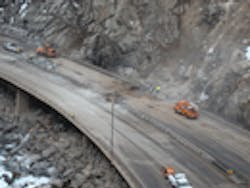Work continues to reopen Colorado’s I-70 after rock slide
Updated: I-70 in Colorado expected to reopen today with truck restrictions
The Colorado Dept. of Transportation (CDOT) was working feverishly Wednesday afternoon to clear away an unstable boulder high above the scene of Monday’s rock slide along I-70 near Glenwood Canyon, just outside the Hanging Lake Tunnel at mile marker 125.
CDOT brought in a helicopter to deliver drilling equipment for blasting operations as it attempted to free an unstable boulder approximately 900 ft. above the highway. Crews were hoping to have the boulder down sometime this afternoon, CDOT said. Not until the boulder is down and the hillside stabilized can the state make a determination on the reopening of the highway. (View a photo gallery of the rock slide area).
The hope is that the boulder will cause little additional damage to the highway, allowing the state to begin repairs to the eastbound side of the highway. According to Mindy Crane, spokesperson for the CDOT, the plan is for state maintenance crews to work and reopen the 17-mile stretch on the eastbound side of I-70 with one lane of traffic moving in each direction.
Repairs to the westbound lanes, which include a gaping 20 ft. by 10 ft. hole, will be outsourced to a private contractor and that process has already begun. An estimate on when that side of the highway could reopen was not available. (See a live stream of this area of I-70)
The impact to trucking fleets, though, will be felt for as long any lanes remain closed. Fleets trying to navigate their trucks around the rock slide area are faced with a number of unpleasant developments: hours added to each driver’s day, delays in shipments reaching their destination points, and costs piling up upon costs due to fuel, extra drivers and hotel stays for fleets operating day-cab tractors.
“That couple of hundred miles translates into a six-hour drive,” Gregory D. Fulton, president of the Colorado Motor Carriers Assn. told Fleet Owner. “Companies are having to either team it or essentially [are staying over]. That’s really adding cost when you talk about additional fuel and drivers.”
Long-haul carriers are being inconvenienced and seeing additional costs due to longer trips around the areas, but Fulton said local carriers hauling food and gas as well carriers hauling oversized loads are particularly affected.
“That location is probably the worst choke part in the region, perhaps in the country,” he said. “This is a very bad area, based on where it happened. You really have a very long haul around it.”
Fulton mentioned that alternative routes may not be able to handle the heavier vehicles, creating an even longer trek for those trucks.
“People don’t realize how many trucks might be overweight,” he said, pointing out that the alternate roads would be taxed with additional vehicles. “We have a number of trucks on alternate routes, but those routes are not designed for the number of vehicles we’re putting on them.”
Due to hours-of-service regulations, trips that carriers used to make in one day are now taking two. Some companies have chosen to send additional drivers along while others are putting up drivers in hotels if they operate day cabs and must stay over. Either way, it’s costing fleets money.
“We have companies working with their customers on rates because you just can’t absorb those costs,” Fulton said. “To some extent, you have some shipments that are not time sensitive, so they are probably being deferred.”
“It’s not like we haven’t had a rock slide before - we have - but this has been a much more substantial event,” Fulton said. “It’s going to be a challenge.”
Fulton added that in addition to the costs associated with the shipments themselves, there are business concerns as well, particularly for places that associate with trucking. Area truck stops may see a decrease in business or maybe even an increase, depending on their location. Gas prices in the area could be affected as well if there is long-term disruption as the added costs to deliver the fuel will be passed along to motorists. One lucky break at the moment, Fulton said, is that it is not growing season in Colorado, so much of the area’s produce is being hauled into the area right now. The cost to deliver time-sensitive fresh produce could be impacted if the closure turns into a long-term situation.
“I guess we’ll find out just how important I-70 is,” Fulton said.
